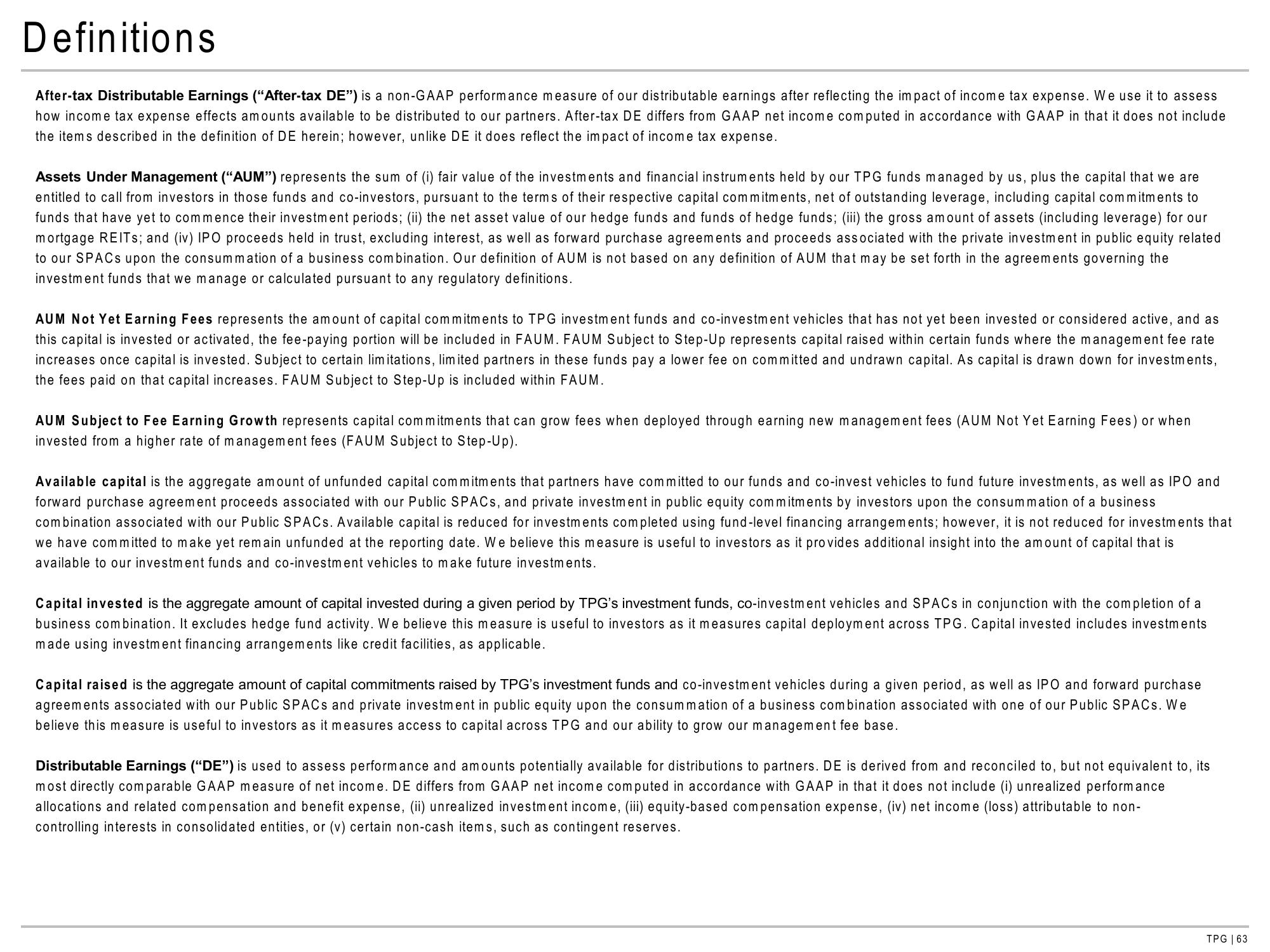TPG Results Presentation Deck
Definitions
After-tax Distributable Earnings ("After-tax DE") is a non-GAAP performance measure of our distributable earnings after reflecting the impact of income tax expense. We use it to assess
how income tax expense effects amounts available to be distributed to our partners. After-tax DE differs from GAAP net income computed in accordance with GAAP in that it does not include
the items described in the definition of DE herein; however, unlike DE it does reflect the impact of income tax expense.
Assets Under Management ("AUM") represents the sum of (i) fair value of the investments and financial instruments held by our TPG funds managed by us, plus the capital that we are
entitled to call from investors in those funds and co-investors, pursuant to the terms of their respective capital commitments, net of outstanding leverage, including capital commitments to
funds that have yet to commence their investment periods; (ii) the net asset value of our hedge funds and funds of hedge funds; (iii) the gross amount of assets (including leverage) for our
mortgage REITs; and (iv) IPO proceeds held in trust, excluding interest, as well as forward purchase agreements and proceeds associated with the private investment in public equity related
to our SPACs upon the consummation of a business combination. Our definition of AUM is not based on any definition of AUM that may be set forth in the agreements governing the
investment funds that we manage or calculated pursuant to any regulatory definitions.
AUM Not Yet Earning Fees represents the amount of capital commitments to TPG investment funds and co-investment vehicles that has not yet been invested or considered active, and as
this capital is invested or activated, the fee-paying portion will be included in FAUM. FAUM Subject to Step-Up represents capital raised within certain funds where the management fee rate
increases once capital is invested. Subject to certain limitations, limited partners in these funds pay a lower fee on committed and undrawn capital. As capital is drawn down for investments,
the fees paid on that capital increases. FAUM Subject to Step-Up is included within FAUM.
AUM Subject to Fee Earning Growth represents capital commitments that can grow fees when deployed through earning new management fees (AUM Not Yet Earning Fees) or when
invested from a higher rate of management fees (FAUM Subject to Step-Up).
Available capital is the aggregate amount of unfunded capital commitments that partners have committed to our funds and co-invest vehicles to fund future investments, as well as IPO and
forward purchase agreement proceeds associated with our Public SPACs, and private investment in public equity commitments by investors upon the consummation of a business
combination associated with our Public SPACS. Available capital is reduced for investments completed using fund-level financing arrangements; however, it is not reduced for investments that
we have committed to make yet remain unfunded at the reporting date. We believe this measure is useful to investors as it provides additional insight into the amount of capital that is
available to our investment funds and co-investment vehicles to make future investments.
Capital invested is the aggregate amount of capital invested during a given period by TPG's investment funds, co-investment vehicles and SPACs in conjunction with the completion of a
business combination. It excludes hedge fund activity. We believe this measure is useful to investors as it measures capital deployment across TPG. Capital invested includes investments
made using investment financing arrangements like credit facilities, as applicable.
Capital raised is the aggregate amount of capital commitments raised by TPG's investment funds and co-investment vehicles during a given period, as well as IPO and forward purchase
agreements associated with our Public SPACs and private investment in public equity upon the consummation of a business combination associated with one of our Public SPACs. We
believe this measure is useful to investors as it measures access to capital across TPG and our ability to grow our management fee base.
Distributable Earnings ("DE") is used to assess performance and amounts potentially available for distributions to partners. DE is derived from and reconciled to, but not equivalent to, its
most directly comparable GAAP measure of net income. DE differs from GAAP net income computed in accordance with GAAP in that it does not include (i) unrealized performance
allocations and related compensation and benefit expense, (ii) unrealized investment income, (iii) equity-based compensation expense, (iv) net income (loss) attributable to non-
controlling interests in consolidated entities, or (v) certain non-cash items, such as contingent reserves.
TPG | 63View entire presentation